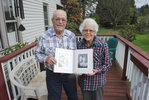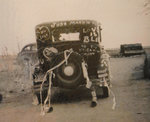


On April 3, 1942, Richard Ayers and Odessa Chadwick married in a small, brick church in Carr, Colorado. The newlyweds were only 18 and had graduated as high school sweethearts less than a year before.
Earlier this month, they celebrated their 75th wedding anniversary, both at the age of 93.
For over the past 54 years, they’ve lived in North Clark County, first in La Center and now at their home in Brush Prairie.
Today, they keep busy with their five children, eight grandchildren and seven great-grandchildren. They tend to their property and prepare for their garden, or have their grandkids do it, they both said with a laugh.
Richard also collects tractors — 24 full-size machines and countless smaller models. They enjoy eating out often, including weekly trips to Hockinson Cafe and a monthly trip to Izzy’s with the other seniors from their church.
“What amazes us is how all our kids are retired now,” Richard laughed while discussing their family tree. “It makes you realize how old we are!”
Life is simple now. But over the last 75 years, that wasn’t always the case.
They decided to marry at such a young age when Richard’s parents announced their plans to move to Southwest Washington.
They married with World War II well underway. After marrying, when their eldest son was only four months old, Richard was drafted.
He had been summoned multiple times before, but was always granted a deferment because he was a farmer. But this time, his summons followed the Battle of the Bulge, where over 80,000 allied soldiers were killed, captured or wounded and the military was deplete of recruits.
Both Richard and Odessa remember those first few years, with Richard away at war, as some of the hardest they faced during their seven decades together.
Richard left on July 28, 1944 — Odessa’s birthday.
“Our comfortable world crumbled around us,” Odessa recalls in an essay she wrote in 2009 titled “The Impacts of WW II on My Life.”
“The fateful day arrived just when Lyn’s personality was showing,” she writes and later adds, “Our house, although only a few yards from my parents, seemed so lonely.”
Odessa bought wall-sized maps of Germany and Europe for their small house and as she listened to radio news would try to piece together where Richard was.
Odessa said that although the loneliness and unknowing was hard, she felt that the birth of their first child was “God ordained” as it forced her to stay busy and not dwell completely on Richard being at war.
“Our prayers for Richard joined his prayers for us. I regularly read the scriptures. I feel protected from feeling sorry for myself most of the time, but there were nights when my pillow was damped from my tears,” Odessa writes, adding that although it was exciting to watch their son grow, it was painful knowing Richard was missing those special moments.
Richard spent a total of eight months in Germany — four of which were combat and would affect him the rest of his life.
Odessa remembers her joy once Richard was finally discharged, but said “the trauma of war followed him home.”
Odessa writes how he would scream in the night and sit straight up and sometimes kick his legs and flail his arms. She would try to wake him and soon began to sense when the nightmares were coming and would move out of range or leave the bed.
“He almost dreaded going to bed, due to the nightmares,” she recalls.
Odessa writes of a time, years later, when Richard had to leave work and spend the rest of the day fighting trauma after someone had blown up a paper bag and popped it, triggering memories of the war and terror.
Even today, at 93, Richard said he still suffers from post traumatic stress at times and Odessa writes of recent incidents occurring.
Following the war, now with two sons, the Ayers began to build their life together but soon faced a trial Richard describes as possibly being more difficult than war.
In 1951, polio broke out in their Colorado community and their 3-year-old son Ken was infected and taken away for treatment while the rest of the family was quarantined.
Ken would spend his fourth birthday alone at the hospital.
During his treatment, the family had no contact with him and if it had not been for Odessa’s cousin working at the hospital, would not have known how he was doing at all, but she was able to call them with news of his wellbeing.
Richard describes the cousin being in the right place at the right time as “a God thing.”
“Sometimes I think that was even harder than the military,” Richard said.
After moving from Colorado to Southwest Washington and back multiple times, in 1962 they finally moved — now with five kids — to North Clark County for good, first at a farm in La Center, then, 10 years later, settling in Brush Prairie.
Along with farming, Richard worked at Union Pacific Railroad for 30 years. Busy with five kids, Odessa was a stay-at-home mom, aside from a two-year stint working at a fishing pole factory in Woodland.
Just before his 30th year at Union Pacific, Richard suffered a heart attack and retired the following year at age 60.
While they may have faced various difficulties throughout their lives, both spoke of the many joys they’ve been “blessed” with, including Richard’s surviving months of combat, Ken’s recovery from polio and the blessing of their children, grandchildren and great-grandchildren. Odessa, as mothers do, was quick to share her happiness in the fact that all five of her children had graduated from college.
Then there’s their own health at 93. Richard’s heart attack was one of many health-related trials the two faced during their marriage. Both have battled and defeated different forms of cancer, and Richard had quadruple bypass surgery.
Today they’re healthy — aside from Richard joking he could barely walk after working on their church's lawnmower the day before The Reflector visited. And although they try to avoid any medication, they both only take two prescription pills each day.
Neither of them offer any profound, secret formula for love and longevity.
They said their perseverance through hard times, along with the many elements of joy they’ve shared over the last seven decades, came from their Christian faith, which continues to be at the core of their marriage.
Odessa said both of their families set examples of faithfulness in marriage and a slowness to anger growing up.
“We credit a lot of it to our parents,” Richard added.
The advice they offer newlyweds is simple.
When there’s a disagreement, look hard at it from the other’s angle. Richard said this is something he doesn’t feel young couples do enough and could be an easy problem-solver for many conflicts.
They also pointed to a small detail of their marriage that now, after 75 years, they see had a big impact. Richard always tells Odessa where he is going whenever he leaves and they always kiss goodbye.
“That always meant a lot to me,” Odessa said.